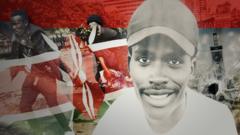In a gripping report, the BBC has unveiled the identities of the Kenyan security forces culpable for the fatal shooting of anti-tax protesters outside parliament last June, a discovery stemming from an analysis of over 5,000 photographs. The investigation reveals that the individuals shot dead were unarmed and did not pose a threat, underscoring the severity of the situation and sparking significant public outcry in the East African nation.
Kenya's constitution unequivocally guarantees the right to peaceful protest, which has been at the heart of the nationwide demonstrations. Despite a directive from a parliamentary committee compelling the Independent Policing Oversight Authority (IPOA) to investigate the deaths, no report has emerged, and the implicated officers remain unaccounted for.
The BBC's World Service team meticulously examined videos and photographs captured by both protesters and journalists during the demonstrations, employing camera metadata and visible public clocks to establish precise timelines. A 3D reconstruction of the scene enabled the tracing of fatal shots fired by a police officer and a soldier.
In a detailed timeline, BBC Africa Eye recounts the events of June 25, 2024, noting that "Gen Z" protesters mobilized through social media for what was to become the capital’s third large-scale protest against the government's finance bill. The atmosphere was joyous, described as a "carnival" by human rights advocate Boniface Mwangi, as young demonstrators gathered early to express their dissent.
This protest came on the heels of earlier actions resulting in lawmakers scrapping tax increases on essential items, though many other controversial measures remained intact. The masses assembled in front of parliament with escalating determination between 09:30 and 14:00, leading to a tumultuous confrontation with officers assembled to manage the crowd.
As tensions heightened, police deployed tear gas, water cannons, and rubber bullets in attempts to push back the demonstrators. Onlookers documented the unfolding events live on social media while their elected officials carried on with parliamentary proceedings.
As the protests became more assertive, demonstrators breached police lines, some entering the parliamentary grounds. In a shocking turn of events, amidst escalating chaos, a plain-clothes officer was recorded inciting violence by shouting "uaa!" (Swahili for "kill"), leading to a barrage of gunfire that ultimately resulted in the deaths of David Chege and Ericsson Mutisya. Both men were found to be unarmed.
The investigators from the BBC were able to identify the shooter from available evidence, with the officer named John Kaboi later confirmed to be an active member of the Central Nairobi Police Station. Despite these revelations, the response from the police force has been one of avoidance, referring to the IPOA for proper investigations, without any accountability mechanism in place for the implicated officers.
The violence did not deter protestors, who again attempted to push against parliamentary security in larger numbers. As events spiraled into mayhem within the parliamentary building, further gunfire erupted, resulting in the death of 27-year-old finance student Eric Shieni, also determined to have been unarmed.
Despite the rapidly deteriorating situation, media outlets captured the courageous acts of bystanders attempting to help the injured during the chaos. The president later thanked officers for their actions during what he described as an attempt to quell an effort by "organized criminals" to "hijack" the protests.
Many have questioned the government's ongoing neglect regarding the deaths and scale of the protests. To this day, no officers have been held responsible, leaving a community shattered and seeking justice. The aftermath of the protests has left a significant mark on the country, with over 39 deaths and 361 injuries reported according to human rights organizations.
In a pivotal address, President William Ruto ultimately conceded to the people's demands, announcing the finance bill would be withdrawn, though the lack of accountability for the preceding violence remains a blistering issue within the national conscious, demonstrating a critical need for policing reforms in Kenya.



















